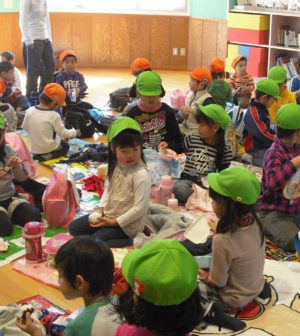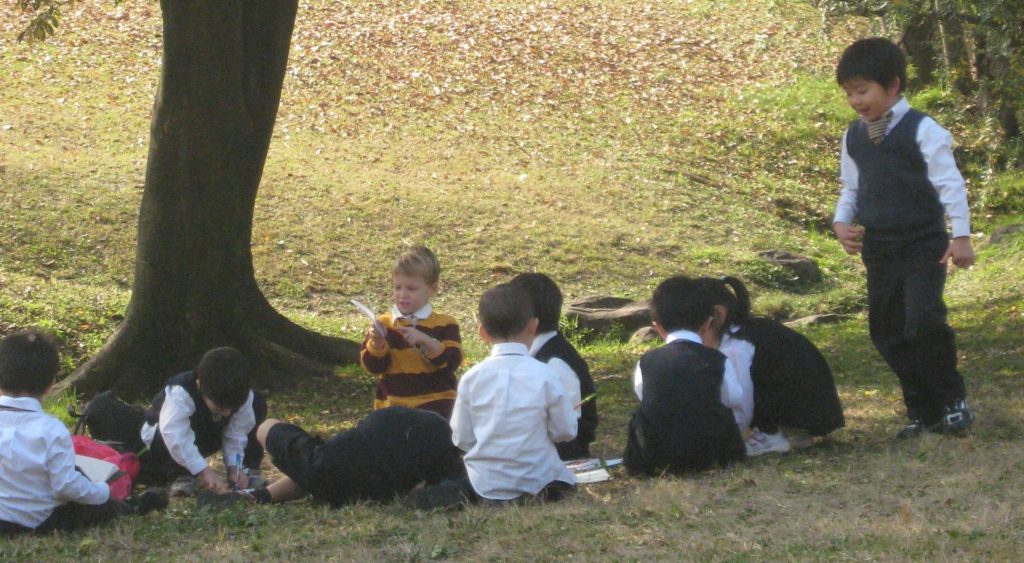- The New York Food Film Festival 2020 has been cancelled amid coronavirus fears.
- Amazing cello artist Luka Sulic on Tokyo stage March 30. Don’t miss it.
- Bob Dylan is coming to Japan
- McDonald’s Japan welcomes 2020 spring with new strawberry frappes
- All-you-can-eat strawberry desserts in 100 minutes.
- “Japan’s Cuisine, Nature, and Wisdom”- Exploring the Past and Future of Japanese Cuisine at the National Museum of Nature and Science
- The World of Shoen Uemura’s paintings of beautiful women
- Treasures from Budapest
- Strawberry and Chocolate Fair at Ikea Japan
- Your Guide to Tokyo’s Fun Ice Skating Rinks
- Yokohama lights up 500,000 leds this year.
- Future and the Arts: AI, Robotics, Cities, Life - How Humanity Will Live Tomorrow
- Egg & Spuma’s Halloween Offering is A Cute Witch Burger
- Strictly Come Drawing
- Kuishinbo Butter Festival
- Japan’s red fall foliage festival
Things you’ve always wanted to know about Japan’s educare philosophy

Choosing the right education philosophy can be confusing for many of those looking into the Japanese preschool or kindergarten system.
If you want to stay involved in your child’s learning experience and establish an open communication with teachers and staff, you first need to understand the Japanese style educare philosophy.
Japan’s Early childhood education is divided into two different systems: day nursery (aka Hoiku-en) and kindergarten (aka Yochi-en). Japanese style nurseries are regulated by the Ministry of Labour, Health and Welfare and kindergartens by the Ministry of Education, Culture, Sports, Science and Technology.
Kindergartens fall under the ‘schools’ category, where children receive formal education but day nurseries are defined as ‘juvenile welfare institutions’, with a strong focus on childcare and taking the role of custodial parenting for parents who work. Daycare accepts babies and toddlers while children above the age of three, go to kindergarten. Japanese style Daycare runs eight hours a day, which is considered a full day in Japan while kindergartens run anywhere between four hours and half day.
As the need for an integrated system of care and education becomes increasingly in demand to catch up with 21st century needs, Daycare and education in Japan is currently in the process of transformation. The 3-5 age groups are now being exposed to educare as a result. Here are the five basic life skills taught in a Japanese educare setting.
Experiential learning through play
Generally, most teachers believe that the word ‘play’ is a broad term that enhances all areas of development – cognitive, social, emotional and physical.
In a Japanese style setting, importance in outdoor environment and outdoor play on a day-to-day basis for children, ranks high in priorities. Teachers see that taking children on a daily walk for an hour or more in addition to regularly scheduled outdoor free playtime, is an integral part of the daily classroom routine. Similarly, encouraging children to learn the vaulting horse and horizontal bar is common practice in Japan and is highly encouraged during these early years in a child’s life.
One teacher said, “Children learn every skill through play. Learning to cooperate with peers and others, developing friendships, these come natural through play. Play also allows children to develop physical strength and resistance.”
Another teacher said ” We do not have to teach children everything through worksheets. When I want to teach children the concept of right and left, I use it in my everyday language; such as, when we are going in the hallway I might say, ‘look to your left’ or ‘look to your right’. So within daily lives (or routines) we can teach children a lot of things.”
The importance of using play within real-life experiences was also emphasized by one teacher.
“Among other things, real-life experience is of utmost importance. For example, finding bugs, children discover more new things rather than just looking at the picture books. They learn by doing things rather than just reading or looking. Also, you cannot compare preschool and elementary school in terms of education. I think in preschool children can freely explore and I believe that is what early childhood should be.”
Fostering harmonious relationships ranks high in the list of life skills taught to children.
If there is one unique quality about the Japanese people, it is their politeness and patience. Politeness exists in all cultures and children in Japan are taught early that being polite and patient allows children to lessen the friction between them when they interact in play.
Through politeness and cooperation, children learn social skills, particularly the virtue of cooperation and forming positive relationships with peers through everyday play situations. For example, one day nursery teacher emphasized the importance of peer relationships:
“Children should learn how to foster positive relationships with peers. Peer relationship is the foundation of all human relationships which can serve them well later in life.”
Teacher’s role
In a typical Japanese kindergarten setting, teacher plays the role of an observer, facilitator and role model.
Day nursery and kindergarten teachers see importance in bringing these 3 roles together in a free play setting. For example, during a discussion of how children learn through play, one teacher described the value of free play, while another explained why observation is essential:
“We have to just watch children first as they play. If we as adults intervene, then that activity is more driven by the adult than children. It is first important for teachers to just watch children as they play. Later, we introduce them to new things as needed.”
Most teachers uphold the idea of being an excellent role model for the children which is often cited by teachers in their job interview.
Children are assigned specific roles and task.
For teachers, assignments and tasks promote children’s development.
At a private day nursery, a group of five-year-old children were assigned the role to prepare rice for lunch, while another group of children served lunch. Teachers from the day nurseries define the purpose of assignment within a classroom, while a kindergarten teacher explain why these assignments are made.
Assignments are designed to teach children things that they don’t know yet and provide them with new experience. The purpose of the assignment is to expand and develop children’s play. If only child-initiated activities take place in play-based curriculum, their play would not develop much. I think teachers should intervene at certain level to provide tasks, assignments and advice.
Teachers assign children duties that children can do on their own, such as farming activities.


